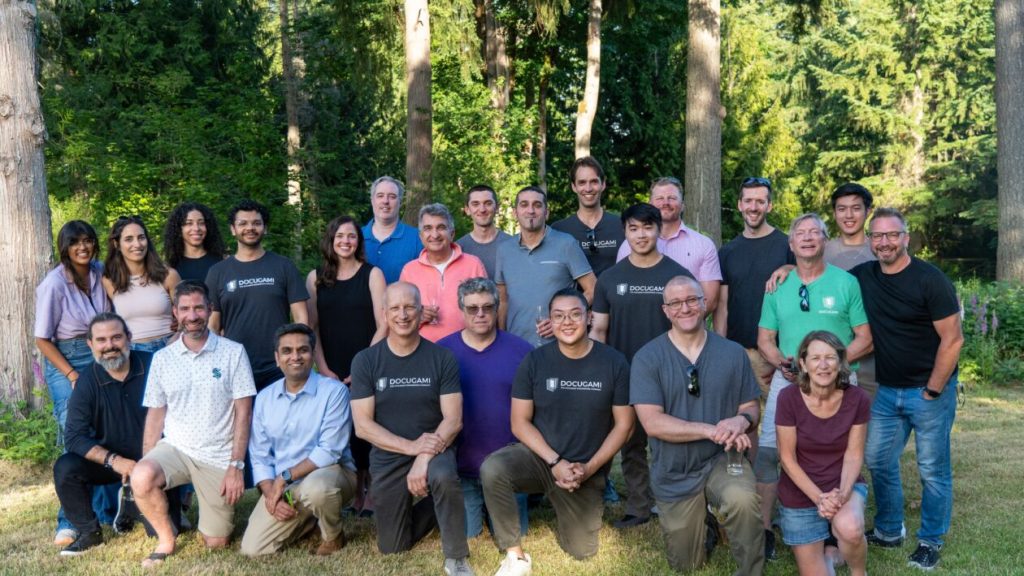Summarize this content to 2000 words in 6 paragraphs
A Docugami in-person meet up in June 2023. Co-founder and CEO Jean Paoli is in the second row in pink. (Docugami Photo)
As President Trump wields tariffs and strains relations with Canada, Seattle area’s Docugami is strengthening its cross-border ties.
The document management startup is eager to reach a bigger pool of talent and new customers with the recent opening of a new subsidiary in Vancouver, B.C.
For co-founder and CEO Jean Paoli, the move had nothing to do with politics or current events. For him, it’s just good business.
“I don’t think this is a policy conversation for us,” Paoli said, adding that the plan has been in the works for 18 months.
If you think about Montreal, Toronto, Ottawa, Vancouver and “other places in Canada, there’s a lot of advanced AI scientists and innovation happening there all the time,” he said.
Docugami has hired two Canadian employees so far. The business overall has 27 full-time employees and 10-to-15 consultants.
Paoli said he created a subsidiary versus a satellite office because it will be easier to hire staff, collaborate with partners and customers, secure contracts, and work with the Canadian government.
Docugami’s technology helps companies in sectors including commercial insurance, pharmaceuticals, electronics and others use generative AI to manage massive volumes of complicated documents. The startup can extract information from the records to make new tables, query and converse with the documents, and create new documents based from the old ones.
Other companies offering document-focused services include Indico Data, Hyperscience, Infrrd and more. One of the competitors, Eigen Technologies, was acquired last year by SirionLabs.
Thriving remotely
Docugami CEO Jean Paoli (center), with board members Bob Muglia (left) and Ilya Kirnos of SignalFire. (Docugami / Dan Morris-Fat Yeti Photography)
While the subsidiary takes Docugami international, its workforce was already spread across America.
The startup launched in 2018 near Seattle and numbered less than a dozen employees when COVID-19 hit in early 2020. At same time, the company closed a $10 million seed investment round.
Paoli was eager to start deploying some of that cash.
“So I started hiring,” he said, finding talent in New York City, Silicon Valley and elsewhere. As the startup grew, all of its processes were created to serve a remote team.
“This is the company culture,” Paoli said, adding that Docugami was only briefly in-person when it was small and located above a garage in downtown Kirkland.
With leadership from Paoli and Hartley Riedner, head of operations, the startup has implemented a suite of strategies to make remote work:
Every Monday is a two-hour meeting for “debugging the company,” Paoli said, when everyone takes two minutes to share their priorities for the week. The session creates transparency and flattens the organization’s hierarchy.
Twice-daily watercooler breaks where employees are invited to chat about work issues or share personal news.
Once every three months are virtual social events, which can be competitive or interactive. A recent example was a live performance by a song writer from Brazil, followed by a conversation with the performer.
Every three to six months is an in-person meet up to connect and collaborate. Food, said Paoli, who is originally from France, is an important feature.
As Paoli sees it, it’s unreasonable to ask team members to relocate from across the country, and they’re succeeding remotely. Employees appear to agree.
“I actually feel as close or closer to the people in this company than I did to many of the people that I’ve worked with in person,” said Mark Murray, communications lead for Docugami.
The goal is to grow Docugami’s Canadian contingent to about 10 workers. The strategy, Paoli said, makes geographic sense regardless of shifting politics.
“The way I think about it is, whatever is happening [in] the last month, at the end of the day, we are neighbors,” he said. “So that’s not going to change.”


